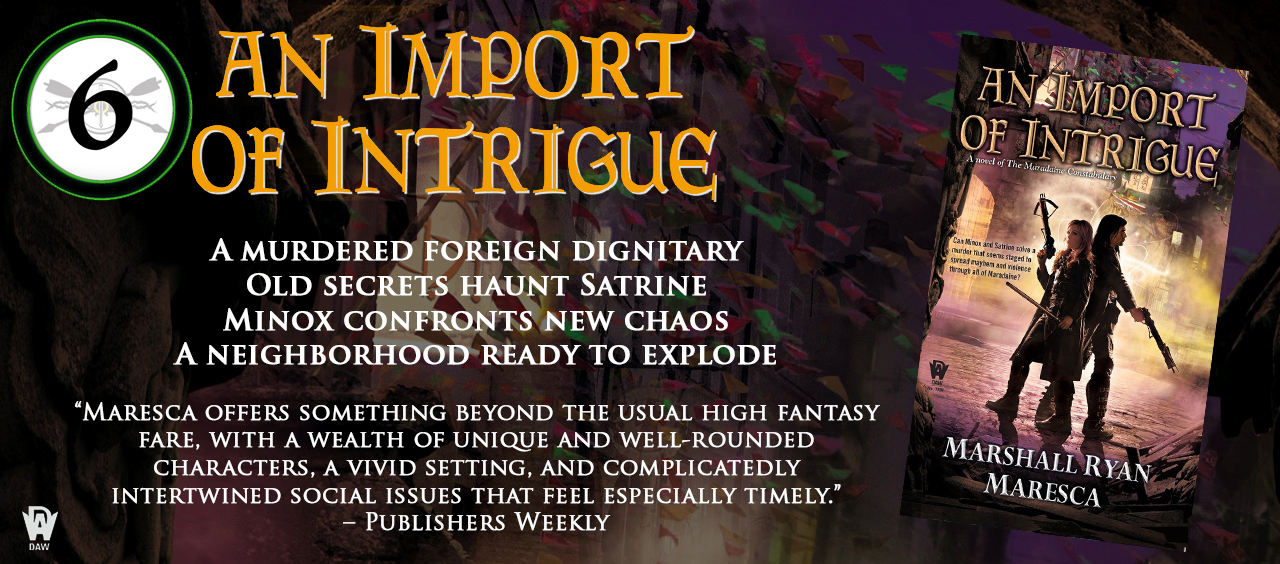
The dead man had no face.
All that remained where a face had once been was a gruesome mess of flesh, bone, and hair. The rest of his body was no better. Satrine Rainey was astounded that it was still recognizable as a man.
She also astounded how, after two months as an Inspector Third Class in the Constabulary of the city of Maradaine, she had grown accustomed to sights like this. Too many of her case assignments involved dead bodies, and Captain Cinellan still delighted in assigning, in his words, the “strange ones” to her and her partner, Minox Welling.
Since Captain Cinellan was still letting her be an Inspector Third Class, and draw the salary she needed to care for her husband and daughters, she wasn’t about to complain.
Inspector Welling responded to the sight by pulling his pipe from his coat pocket and stuffing it with his favorite Fuergan tobacco. “We were told this one was horrible,” he said. “We were certainly not lied to.”
Satrine stepped out of the refuse-strewn alleyway where the body had been found, finding little comfort in the busy streets of the Inemar neighborhood. Plenty of people were crowding a small distance away, held back by the footpatrol officers, gawking at the spectacle. Near the front of the crowd were a group of girls, around twelve or thirteen years old. Blouses with the sleeves torn off, most likely to deal with the sweltering summer heat, and tough smirks on their faces. Twenty-some years ago Satrine would have been one of those girls, trying to get a peek. There was always comfort in seeing that Inemar had chewed up and spit out someone else.
She turned back to the alley. “Based on the heat and the smell, he couldn’t have been out here very long.”
“Agreed,” Welling said, crouching by the mauled body. “Whoever dumped the body here made little effort to even hide it.”
“So our suspect is someone who would bring a dead body and dump it with other garbage in the middle of the day,” Satrine said. “In other words, an idiot.”
“Which are, unfortunately, not in short supply.” Welling stood up and took a puff on his pipe. Looking at the cracks in the cobblestone he added. “Almost no blood flowing from the body. The poor soul probably lost it all quite quickly.” Satrine was amazed how calm he looked, not even seeming hot, despite still wearing his overcoat in this swelter. She had left her coat at the stationhouse, wearing just her inspector’s vest and shirtsleeves. Even with that she was sweating up a swamp.
“Anything in the trash with him that helps you determine where he came from, who he is?” Satrine asked. Welling was gifted at making brilliant observations based on minimal details.
He shook his head and stepped out. “Nothing incriminating or remarkable. The past few days’ worth of the South Maradaine Gazette, but all that indicates is it’s probably from this neighborhood. Which I already presumed. Whoever dropped the body likely didn’t go very far to do it. Probably no more than two blocks.”
“Why do you think that?” Satrine asked.
“For one, as we’ve determined, idiocy. Second, the method of disposal hints at laziness. Whoever did this wanted nothing more than to get rid of the body with as little effort as possible. Come here with a wheelbarrow, drop it in the alley, and get away.”
Satrine turned out to the crowd. “I don’t suppose anyone saw someone come by here with a wheelbarrow? Maybe carrying a dead body?”
The girls in front chuckled, but no one gave a useful response.
“I suppose it was worth the effort to try that,” Welling said.
Satrine shrugged. Inemar residents weren’t particularly known for helping out the Constabulary. That had been the case in her childhood, and during her months serving here she hadn’t seen anything to show it had changed.
A mule-drawn wagon approached the alley. The driver reined it to a stopped and hopped down. Leppin, the stationhouse’s examinarian and bodyman, came over with a wide grin on his tiny head, looking all the sillier wearing the leather skullcap with various lenses in place over one of his eyes.
“What’s the word, specs?” he asked in his think northeastern accent. “Heard it’s a real mangler.”
“Quite,” Welling said. “In fact I doubt this was done by human hands.”
Satrine thought on this. “Factory accident? That hurts your proximity idea.” The closest works shop was over in Dentonhill. There were a couple sewinghouses in this part of Inemar, but nothing capable of threshing a man to this extent.
“It does.” Welling puffed on his pipe a bit more. “Though that is the sort of thing it puts me in the mind of.”
Leppin had gone back to the alley and whistled low. “I ain’t seen anything like this in a while.”
Satrine came a bit closer. “All right, consider this. The body is horribly mangled, but casually dumped off. If this had been a true murder, someone who wanted him dead, they would have been as emotionally invested in getting rid of the body as they would in killing him. But if it’s an accident . . .”
“Yes,” Welling said, snapping his fingers. “Then there’s no investment. The dead man is an inconvenience, as he mostly represents . . .” He thought for a moment. “He represents something dangerous they’re trying to keep quiet.”
“Like what?”
“Something with animals,” Minox said. “Those injuries could be from an animal.”
Leppin nodded. “Something vicious.”
“Another dogfighting ring?” Satrine offered. “We’ve broken up a few in the past couple months.”
“I don’t think this was dogs,” Leppin said. He pointed to one of the enormous gashes on the man’s chest. “That’s not a bite. Not of any dog I’ve ever seen.”
Satrine’s eye moved from the wound to one of the bits of unsullied flesh. Near where the neck met the shoulder, a reddish-purple mark. “Leppin, clean off the blood by his neck.”
“Eh?” He pulled out a rag and wiped it away. It was definitely purple, and not an injury from the mauling. “That’s a birthmark, isn’t it?”
“Pretty strange one,” Leppin said.
“Of note?” Welling asked.
“Of note, indeed,” Satrine said. Memory flared up. “I think I know who our dead man is, Inspector. And I have a suspicion that fits our theory.”
* * *
Gregor Henk had been a few years older than Satrine. A boy always pulling a grift or a hustle, usually for his uncle, when he wasn’t trying to get girls’ skirts off. He was also one of those boys who thought the best way to get girls’ attention was to walk around their corners with his shirt half open. That had never gotten Satrine’s interest, but she couldn’t deny that it worked on several of the neighborhood girls at the time.
Satrine could never even contemplate it, since she had always been repulsed by the ugly purple birthmark on his neck and shoulder.
“Gregor Henk,” she told Welling as they walked down Selim. “A lot of mouth on that boy, and not much else. To be honest, I’m surprised he lived this long.”
“You’re certain of that?” Welling asked.
“That birthmark is quite the giveaway.”
“So where are we going?”
“Giles Henk was his uncle. Kept a few tenement flops in one of the side alleys off of Selim. Was one of those guys who did his best to put crowns in his pocket by getting kids to work the streets for him. You know the type, gives them a place to bed down, but at a price.”
“You ever?” Welling asked.
“I did a lot things back then to stay warm and fed.” She had done even worse as an agent in Druth Intelligence. Despite that, she had then been blessed with fourteen years of “normal” life with a doting husband in the Constabulary and two brilliant daughters. Everything had fallen on her shoulders when her husband was beaten and drowned nearly to death. The work she was now doing, on her old streets, if that was her account coming due, she could live with that.
“So you’re saying Giles Henk is our killer?”
“I’m saying Giles is probably who dumped the body. A block away and incredibly lazy. So he was involved, or knows who is.”
“Presuming he’s still alive,” Welling offered. “He’d be an old man now.”
“I’m sure he is,” Satrine said. “He’s the sort of man who always manages to survive.”
They approached the door, shabby and paint peeling, tucked away in a below-ground stairwell in the back of the alley. Some of Inemar had cleaned up over the years, but this part certainly hadn’t. Even the backhouse was still there at the end, though it was little more than a rotten skeleton of wood and shingles. The slightest touch would likely collapse it.
Satrine wondered if that was the one she had been locked inside that one winter night. The memory of it happening was so clear, but now that she thought about it, she couldn’t quite recall which backhouse it was.
Inspector Welling was already rapping his knuckles on the door.
“No response,” he said after a minute.
“Let me try something,” Satrine said. She gave a single hard knock, followed by six quick raps, and then waiting a moment, concluding with another hard knock.
“Really? A secret knock?” Welling almost looked offended.
“That’s the kind of bloke this guy is,” she said. “That’s what he thinks clever is.”
The door opened a crack, and a leathery face covered in white hair appeared. “That’s an old code. Ain’t heard it in years.”
“But you remembered it,” Satrine said.
“Course I did. Who the blazes are you?”
“City Constabulary, Mister Henk,” Welling said. “We’d like to ask you a few questions about your nephew. May we enter?”
“Suppose,” he said, stepping back. “What’s that fool gotten into now?”
Satrine entered the place, which smelled like sewage and rotten meat. Her stomach rebelled for a moment, but she held it down.
The old man was still every inch Giles Henk, wearing nothing but dirty skivs, his scrawny body covered in a shaggy fleece of white hair. There was little furniture, and that which was there—a table and a couple chairs—Satrine would swear were the same ones from twenty years ago. The floor was covered in refuse—mostly newsprints, the kind often used to wrap potatoes or strikers or fish crisps.
Henk sat down at the table and poured himself a cup of vinegary-smelling cider.
Welling took the place in stride. “We’ve found your nephew Gregor, dead from multiple injuries, in a nearby alley.”
“Did you?” Henk took a long drink and poured another cup. “Somebody get a jump on him?”
“It didn’t seem to be someone—” Satrine started.
“Because he ran up debts, I can tell you. Someone was going to grab hold of him one day or another and make him pay.”
“Could you name anyone who might have a particular grievance? That could help our investigation.”
Henk screwed up his face. “Name anyone? I’d have to think about it.”
“Don’t hurt yourself,” Satrine said.
“I know you, red?” he asked. Even with Satrine’s uncommon hair color, he didn’t recognize her. Maybe his eyes were going.
“We’ve met before,” Satrine said. “I’ve been down here before.” She pointed to the door in the back of the room. “I remember some of the things that happened back there.”
“Oh, what?” Henk asked. “I don’t know what you’re talking about.”
“So you don’t have kids sacked out back there? Maybe a couple you can lend to your friends?”
“Aw, blazes, no. Been a long damn time since anything like that happened here.”
The man had no shame about his past. She almost admired that.
“So what’s back there now?” Welling asked, approaching the door.
Henk jumped out of his chair, quite spryly for an old man. “Some of my mates are, you know, sleeping off their cider. They’d be pretty cranky if you go back there.”
Welling raised an eyebrow, and then pounded on the back door. “City Constabulary! Come out and be identified!”
A sound came from the back room, but it definitely didn’t come from one of Henk’s friends. Or anything human.
Henk was unfazed. “See, pretty cranky.”
Satrine was on her feet. “You aren’t keeping kids back there anymore?”
“No, no, red. I got nothing back there with kids. I tell you, I don’t do that no more.”
She looked to Welling. “Cause?” A complex question reduced to one word. Legally they had no right to charge into a private residence. Even having been invited inside to one room, they couldn’t arbitrarily go through a closed door. The City Protector would throw out their arrest if they did that. Unless they had cause—a sincere belief that there was active crime or imminent danger that required immediate action.
Welling responded by drawing his handstick, which she took for agreement.
“Hey, you don’t wanna—” was all Henk got out before they were at the door, pushing it open. Satrine pulled out her crossbow and took point. She’d been in this place before, after all. She doubted it could really surprise her.
She took only a few steps into the dim room before her foot slipped. She lurched forward, and realized that there was now a pit dug into what had been an earthen floor. She forced herself back, almost crashing into Welling.
“Saints,” she muttered, and Welling’s hand on her shoulder steadied her. “What is this, Henk?”
“I think we’ve found Gregor’s killer,” Welling said, pointing into the pit. Satrine couldn’t see into it very well, but even in the darkness she could see something large and hairy moving about.
Then it bellowed up at them.
“A rutting bear?” Satrine asked.
Before Welling could respond, they were struck from behind, sending the both of them careening into the pit with the bear.
Satrine landed badly—her left leg still hadn’t fully recovered from getting stabbed during her first case with Welling—but rolled with the impact. Her crossbow fired wildly, striking the bear in its leg.
Welling landed like a cat, and moved to Satrine to aid her to her feet.
“Good luck down there, officers!” Henk yelled from the lip of the pit. “He’s probably not too hungry, so you might make it!”
The bear roared and charged at the both of them. Getting shot probably did not improve its mood at all. Its massive claws swept in at Satrine’s head.
Before she could move away, the bear’s paw slammed into a patch of empty air as if it were solid steel.
Welling’s hand was held out in front of him, a blue nimbus surrounding it. The bear struck again, its paw again bouncing off of apparently nothing.
“Thanks,” Satrine said. Welling avoided using his magic, since he was Uncircled—no Mage Circle would ever cooperate with the Constabulary or take an active officer as a member. It was dangerous for an Uncircled mage to do magic in public, with no legal protection against a mage-fearing populace. Also as an Uncircled mage, he was untrained, using his magical abilities mostly on instinct.
Sweat beaded up on his brow. “I cannot hold it back indefinitely,” he grunted through tight teeth. The bear growled and pressed against the solid wall of nothing.
Satrine reloaded her crossbow, took aim and fired. She hit, center of the bear’s chest. It howled and slammed its paws against the force the Welling was holding up. Welling dropped to his knees, both hands held above his head.
“Takes more than that to kill a bear, red!” Henk yelled from the top of the pit.
Satrine grabbed Welling’s crossbow off his belt. “Hold it still!”
“I will endeavor,” Welling said. Making a noise like a wagon crashing, he came up on his feet and brought up his other hand. The blue nimbus shifted to an angry green, with sparks and snaps flying from his left hand. The bear flung back against the wall of the pit, its arms pinned by the green. Its great maw opened wide in a deafening roar.
Satrine took her shot.
The bolt buried itself deep in the back of the bear’s throat. With a pathetic whine, it dropped to the ground.
Welling did the same.
“You all right?” Satrine asked him.
“Just need a moment,” he wheezed out. “Mister Henk.”
Satrine needed no further prodding. She jumped up on the rough wall of the pit—crudely constructed, easy enough to climb once there was no bear trying to maul her. In a matter of seconds she was over the edge of the pit and back in Henk’s sitting room.
She had her handstick drawn, but Henk wasn’t there. His front door hung open, swinging idly. Not that she could blame him for running. Trying to kill two Constabulary inspectors was going to get him many, many years in Quarrygate.
Satrine ran out into the alley. Her bad leg twinged, not wanting to work this hard. She ignored it as best she could and pressed on. Henk was stumbling his way toward the street, trying desperately to go as quickly as he could while pulling his pants on. He was carrying his boots in his teeth.
“Henk! Stand and be held!”
The old man gave a frightened cry, letting the boots drop to the ground. He tore off, barefooted, into the street.
Satrine sprinted down after him, pushing through the protests her leg was giving her. As she ran, she felt a small smile creep on her face.
She was going to enjoy this far more than she should.
Satrine closed the distance in moments—it wasn’t hard to catch up to a barefoot old man in half-fastened pants—and brought her handstick down on his shoulder. As he tumbled down, she added another shot to his back. As soon as he was on the ground, she pinned him with her knee.
“Mister Giles Henk, you are lawfully bound,” she said, pulling her irons off her belt. “You are accused of crimes and will receive fair trial.” Shackling his hands behind him, she pulled him back up on his feet.
“Name my crimes,” Henk said. This was the common response, and lifelong sludges like Henk were familiar enough with the rituals of arrest to know that the specific crimes they were to be charged with had to be identified. Much of the law involved protecting common people from spurious arrests and Constabulary abuse, including this.
Welling came up, still looking pale and winded. “You are charged of harboring a dangerous animal in residence without license. You are charged with reckless care of that animal, resulting in the death of Gregor Henk. You are charged with attempting to kill two officers of the City Constabulary.”
“Hey, hey,” Henk said. “I never did nothing of that sort. I just bumped into the two of you, it was all dark in there, and you fell in the pit.”
“Tell it to the City Protector’s Office,” Satrine said. “You are obliged to come without incident.”
Henk shrugged and started to walk.
“You don’t look well,” Satrine said to Welling as they made their way back to the stationhouse.
“That was draining,” he said. “I’ll be fine once I eat something.”
Satrine sighed. “I suppose there’s always the fast roll cart outside the stationhouse. Though I honestly cannot fathom how you choose to eat those things. I still can’t figure out what meat she’s using.”
“It isn’t choice,” Welling said. “It’s necessity.”
PURCHASE AN IMPORT OF INTRIGUE:
Additional Links:







